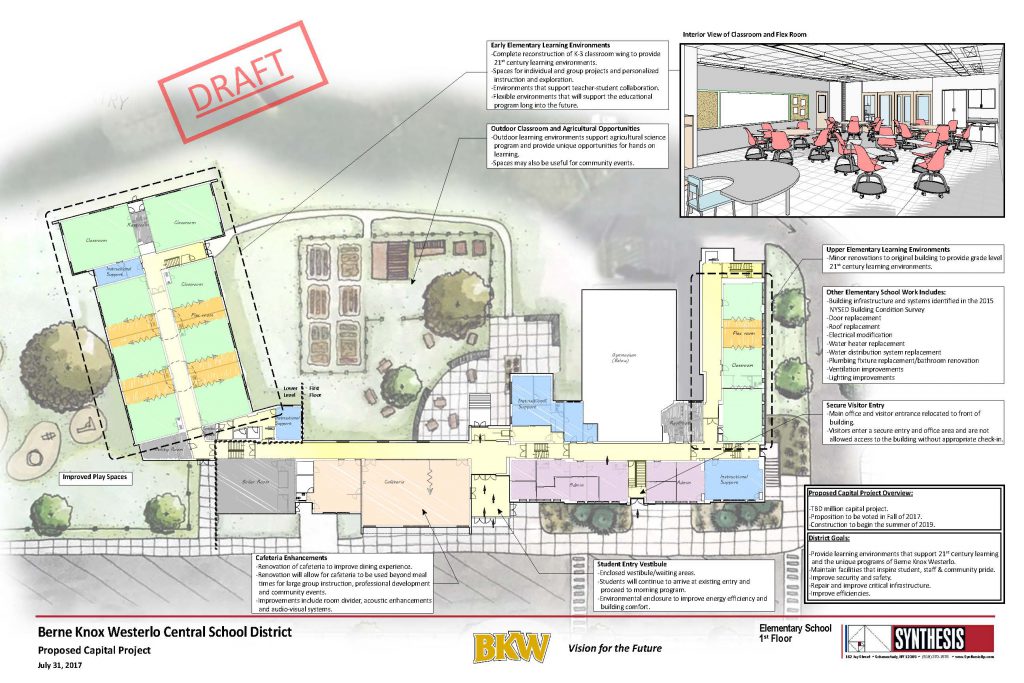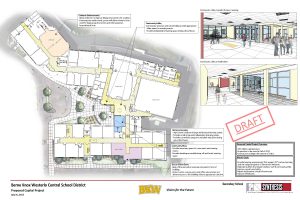BKW needs to capitalize on favorable financial conditions to provide better facilities for our students, Superintendent Dr. Timothy Mundell told the BKW Board of Education at its July 31 meeting.

After a detailed presentation on how improved building conditions correlate to increased academic performance, Mundell noted that because of BKW’s near-80 percent state-aid ratio, and the $1.6 million in capital reserves we already have, the average annual cost to a taxpayer would be between $20 to $35 per $100,000 of assessed property value, over the life of the loan.
This falls in line with the feedback the district received during the school budget vote in May. When asked how much they would be willing to invest in improvements to the Elementary School, 86.6 percent of respondents said they would pay an additional $21-$50 in additional taxes per $100,000 in assessed home value.
“I believe we need this project to fulfill our mission of educating BKW’s children to the best of our ability,” said Mundell. “This would also position us as a beacon in the Hilltowns and a hub of the community – a resource for our neighbors in BKW, and a destination for new families looking to send their children to a modern school in a great community.”
“This is the right thing to do and the right time to do it.”
One vision, two propositions
The Board of Education is considering two propositions for an anticipated November 2 vote.

The first will be the previously discussed $14.8 million in repair and modernization work primarily in the Elementary School. The second proposition would be approximately $5 million in improvements to the Secondary School. This proposition would be contingent on the passage of the $14.8 million project.
“We can’t have our kids leaving the primary school with all of its updates and then going backwards when they get in to middle and high school,” said Board President Matt Tedeschi. “We need to do this right for our students. This investment would be directly tied to academic enhancements and improved quality of the classroom experience.”
Board member Helen Marie Lounsbury noted at the meeting that the equipment in the high school is dated.
“The students that are in high school now are using equipment that was there when they started elementary school,” she said.
Tedeschi said that it would be unfair to the community to ask them to approve another capital project so quickly after this one is completed.
“I think we need to capitalize on the favorable financial conditions,” he said. “lf we don’t do this we will have to go out for another bond in 5-6 years. Let’s not do that to the community.”
Fiscal responsibility, project accountability
The BKW tax levy has increased only 0.5 percent over the past six years, Tedeschi noted at the meeting.
“We have managed the budget very well,” he said. “Most people of the community have seen their taxes decrease because the assessed values have increased. Due to the management of BKW’s finances over the past couple of years we have saved money for the community year over year, with minimal or no tax increases. Now we are asking them to make a $3-per-month investment into our children’s’ futures.”
“Our aid rate is substantially high at 79 percent right now and we may not get this opportunity again,” he said, adding that interest rates are currently low and will go up as the economy grows.
Preliminary estimates show the current $14.8 million project will cost taxpayers $18 per year on average over the life of bond at a $100,000 home value – or $1.50 per month. Investing an additional $5 million to modernize the secondary school brings the cost to $35 per year, per $100,000 of assessed value – or less than $3 per month for that same household.
“The time is now for this project,” he said.
In order to ensure that the project is managed responsibly, the board hired Sano Rubin as construction manager. Sano Rubin was vetted by the Board of Education, and was chosen after a request for proposals was issued and interviews were held. They will provide a team of estimators, project managers, superintendents, and field representatives to oversee every aspect of a project – planning, design, construction, post-construction –to ensure the BKW community gets the highest value for their construction dollar.
The board also appointed itself lead agency for the State Environmental Quality Review needed to assess any environmental impact a capital project may have. The purpose of having a lead agency is to coordinate the SEQR process so that when an action is to be carried out, funded or approved by two or more agencies, a single integrated environmental review is conducted. This lead agency is responsible for making key SEQR determinations during the review process.

You must be logged in to post a comment.